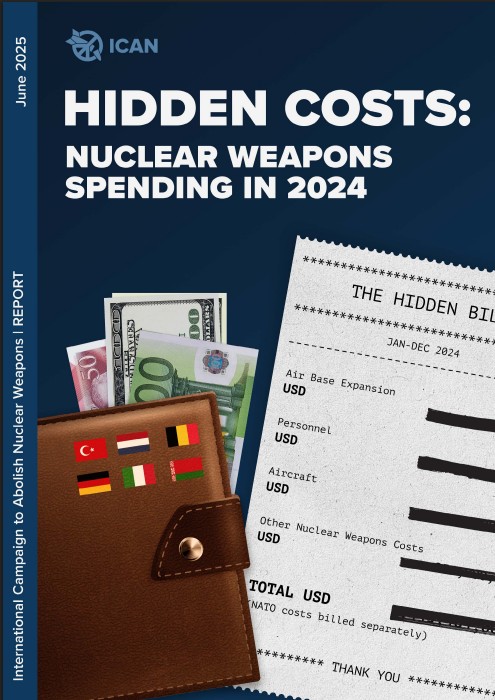ICAN: New report "The Hidden Costs: Nuclear Weapons Spending in 2024" now online

The International Campaign to Abolish Nuclear Weapons (ICAN) has published a new report titled "The Hidden Costs: Nuclear Weapons Spending 2024," highlighting an 11% increase compared to 2023, equivalent to about $10 billion more in spending by the nine nuclear armed states, which are United States, China, France, India, United Kingdom, Israel, North Korea, Russia and Pakistan, exceeding $100 billion. The country that invested the most in nuclear weapons in 2024 is the United States, with funding of $56,8 billion,followed by China with $12.5 billion and the United Kingdom with $10.4 billion.
The nuclear weapons sector continues to be a growing market, with current contracts worth over $463 billion. Some of these agreements extend for several decades, highlighting a long-term commitment to this controversial field. In 2024 alone, new contracts worth over $20 billion were signed. The companies involved not only produce but also invest significantly in lobbying activities, seeking to influence government decisions in their favor.
The report states that, according to data collected by experts, not yet confirmed but corroborated by leaked official sources, in 2024 there were U.S. nuclear weapons in Italy, Germany, the Netherlands, Belgium, and Turkey, while the presence of Russian weapons in Belarus has not yet been confirmed. Specifically, Italy would have the highest number of weapons, 35, hosted at the American air bases in Aviano, Friuli Venezia Giulia, and Ghedi, in the province of Brescia. Regarding this, the report highlights a serious problem of lack of transparency, given the absolute ignorance in which citizens and legislators are deliberately kept about the location of the weapons and the percentage of their taxes allocated to this sector. According to a statistical survey conducted in April 2025 in six European countries, including Italy, the majority of the population is opposed to the presence of nuclear weapons on their territory, with a peak of 63% dissenting in Italy. This data highlights a stark contrast between public opinion and current defense policies.
Finally, the report denounces the waste of economic resources allocated to nuclear weapons, given the impossibility of winning a nuclear war, which should never be fought anyway. The funds for 2024 could have been used to address the insecurity arising from the progression of climate change and the serious loss of biodiversity we are witnessing, or to improve essential services such as healthcare, education, and housing, or to cover the costs of the United Nations, which today faces very significant cuts from member countries that threaten its dismantling.
At a time when the risk of nuclear escalation is at its highest ever, nuclear-armed states continue to practice the doctrine of deterrence with each other as the only path of dialogue, threatening their use and further exacerbating fragile international balances. Despite this, the report highlights an encouraging fact: 98 states, supported by over 700 civil society organizations, have signed, ratified, or directly joined the UN Treaty on the Prohibition of Nuclear Weapons. This demonstrates an increasingly widespread awareness and concrete commitment to nuclear disarmament at a global level.

